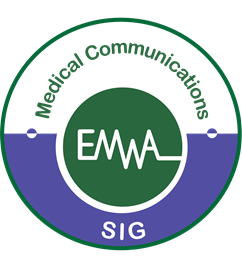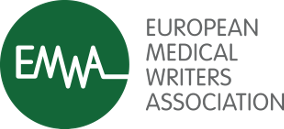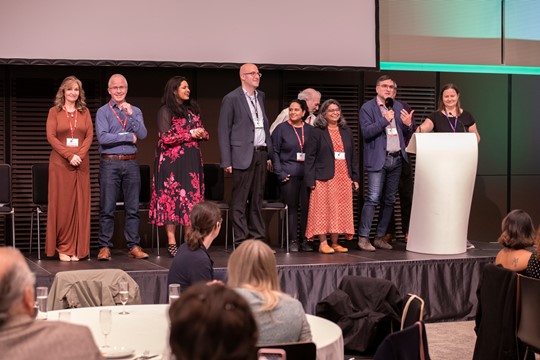Med Comms SIG

All members:
Chair:
Co-chaired by Slavka Baronikova and Andrea Rossi.
Committee Members:
Andrea Bucceri and Thomas Schindler.
SIG Supporting Members:
Amanda Whereat-Terdjman, Anna Sofia Correia, Art Gertel, Beatrix Doerr, Chris Winchester, Claire Harmer, Irena Zurnic Bonisch, John Gonzalez, Lisa Chamberlain-James, Martin Delahunty, Martina Colucci, Namrata Singh, Priti Nagda, Sampoorna Rappaz, Sara Rubio, Uma Swanitathan.
E-mail address: medcomsig@emwa.org
MedComm SIG objectives:
The Medical Communications Special Interest Group (MedComm SIG) intends to support wide medical communication activities including scientific disclosure & publications, communication with the general public, and to act as a source of affordable and updated information.
Latest news and activities
- Translators Meet & Share 11th July 2024 click here to view
- Translators Meet & Share 23rd May 2024
- ISMPP newsletter on AI: Exploring the future of generative AI in medical publishing
- LSE blog: AI paper mills and image generation require a co-ordinated response from academic publishers
- Updated ICMJE recommendations on AI
-
Artificial intelligence (AI)-assisted technology: updated guidelines from the International Committee of Medical Journal Editors (ICMJE)
- Good Publication Practice (GPP) Guidelines for Company Sponsored Biomedical Research: 2022 update. Click for access to the full text.
- Putting plain language summaries into perspective by Caitlin Edgell & Adeline Rosenberg. Click here to access the full text
- The ICMJE updated recommendations for reporting biomedical research including a new section on preprints
- Links to 8th EMWA symposium on predatory publishing - Session 1 - Session 2 - Session 3
- Link to symposium on predatory publishing
- Podcast: Coronavirus conversations: Science communication during a pandemic.
- Article titled, "Will the pandemic permanently alter scientific publishing?" published in Nature. Click here to view it on the Nature website.
- Retracted coronavirus (COVID-19) papers on Retraction Watch.
- The 2020 European Meeting of the International Society for Medical Publication Professionals (ISMPP). Meeting notes from Day 1 and Day 2.
- World-leading pharma collaborates call for plain language summaries of peer-reviewed medical journal articles
Subgroups and topics
Scientific Publishing
- Key subgroup members: Andrea Bucceri, Thomas Schindler, Lisa Chamberlain James, Art Gertel, Andrea Rossi, Chris Winchester, Martin Delahunty, Sampoorna Rappaz, Slavka Baronikova.
- Putting plain language summaries into perspective https://www.tandfonline.com/doi/full/10.1080/03007995.2022.2058812
-
What terminology are health journals using to refer to plain language summaries of peer reviewed manuscripts? A new open access study published last week shows 18/27 (66.7%) journals with plain language summary information in author instructions are using the term “plain language summary”. See the full study here, and key results in Table 2.
Objectives
Plain Language Summaries of Scientific Publications
- Development, best practice, accessibility and discoverability of scientific peer-reviewed publications-associated plain language summaries
- The activities of this group include the identification of, and update on, best practice concerning writing for patients and the general public.
- This group is working on the development of the CDISC glossary as well as interacting with EMA for the development of the EMA glossary.
Links to relevant documents
- CDISC glossary
- Open Pharma recommendations for plain language summaries of peer-reviewed medical journal publications
Open Science and Open Access
- preparation of ESS and seminars at EMWA conferences and developing articles for MEW
Predatory publishing and congresses
- development of seminars at EMWA conferences, webinars, articles for MEW as well further educational materials
- JPS with AMWA and ISMPP, liaison on educational activities with these associations with aim to enlarge the JPS impact, knowledge and training
Links to relevant documents
- 2020 webinar to be added
- AMWA-EMWA-ISMPP Joint Position Statement (JPS) on predatory publishing and available translations
- Why do authors publish in predatory journals?
- Defining predatory journals and responding to the threat they pose: a modified Delphi consensus process- BMJ Open
- Predatory journals: no definition, no defence - a Nature article.
- Predatory publishing presentation
- Survey on predatory publishing: https://survey.alchemer.com/s3/5949743/Combatting-Academic-Predatory-Journals-and-Conferences
Predatory Publishing Seminar
Translation Enthusiasts
- Key subgroup members: Claire Harmer, Ana Sofia Correia
Objectives
The Translation Enthusiasts group aims to explore how to enhance the quality and effectiveness of health-related communication across diverse linguistic, cultural, and regulatory landscapes. It focuses on discussing different approaches, tools, and resources that support medical translation and the broader spectrum of medical communications, by serving as a hub for medical translators and all professionals involved or interested in global health communications.
The activity of this group includes writing articles on medical translation to explore the various different approaches, tools and resources that can be used. It also aims to raise awareness of medical translation in the wider med comms field.
Links to relevant documents
- EMWA MW Volume 33, Issue 1 - Translation
- Gained in Translation - Editor: Ana Sofia Correia
RWE generation, disclosure and publishing
- Key subgroup members: Andrea Bucceri, Catherine Hill, Tim van Hartevelt
Objectives
The activity includes the identification of best practices to disclose RWE data, data transparency (including the registration and publication of observational trials) and the levels of evidence.
An SBB is under preparation for next congress.
Links to relevant documents
- EMWA 2019 symposium slides to be added
- STROBE guidelines
Corporate Communications
Key subgroup members: Jessica Norberg, Sampoorna Rappaz, Uma Swaminathan, Lisa Chamberlain James
Objectives
The focus of the sub-SIG is medical and scientific communication deliverables that are not related to publications. The scope includes but is not limited to materials for conferences, marketing, sales and educational initiatives. Activities will include discussions, Meet and Shares and providing information on the role of the medical writer or medical copywriter, best practices, ethical considerations, and effective writing strategies, such as scientific storytelling.
Links to relevant documents
8th EMWA Symposium on Research Integrity
The 8th EMWA symposium day explored the challenging topic of research integrity. Research integrity is at the core of the research endeavour. It is the basis for researchers’ trust in each other and in the research record and, equally importantly, society’s trust in research.
To address mounting concern about research transparency and reproducibility, researchers, funders and journals need to work together to deliver practical solutions. Addressing research integrity is a shared task and we, as medical communicators and publication planners, have an important role to play.
At the first virtual EMWA symposium, researchers, journal publishers, the pharmaceutical industry and medical communications agencies provided their perspectives, gave their recommendations and fostered real-world discussion on research integrity – why it matters to all of us, and how we can work together to strengthen it.


